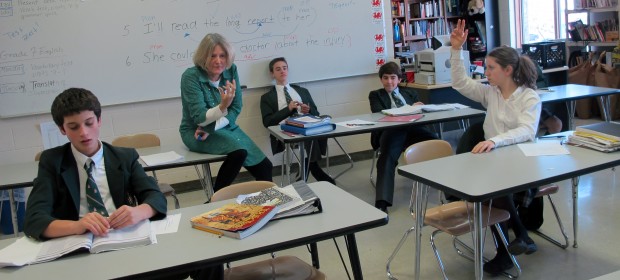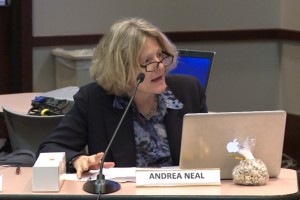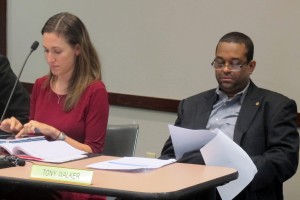How A Common Core Critic Could Shape State Board Debate On Standards

Elle Moxley / StateImpact Indiana
Andrea Neal asks her eighth grade history students questions during a presentation. She says she's worried the Common Core is squeezing out non-tested subjects.
Three years ago the State Board of Education unanimously adopted new expectations for what Indiana students should know and learn at each grade level.
But pushback against the nationally-crafted Common Core triggered a legislative “pause” last year until the new academic standards could be studied further. Now the clock is ticking for state education officials to reaffirm their support for Common Core or select a new direction for Indiana schools.
And on the State Board, too, support for the standards has shifted. Though a majority of the panel likely still approves of the Common Core, at least one voice of dissent has emerged.
“It’s not possible the very best standards will be determined to be the Common Core,” says State Board member Andrea Neal, who Gov. Mike Pence appointed this summer. “They lack rigor, they lack content, and they’re more about behavior than they are about knowledge.”
- What's Next For Indiana's Controversial StandardsStateImpact Indiana‘s Elle Moxley explains how support the Common Core among education officials has changed since 2010.Download
‘I Don’t Even Know What Some Of This Means’
Neal teaches middle school English and history at St. Richard’s Episcopal School in Indianapolis, a private school not accredited by the state. That means she doesn’t have to follow Indiana’s guidelines on academic standards.

Jashin Lin / WTIU News
Andrea Neal says she believes she was appointed to the State Board of Education because of her anti-Common Core stance.
“At my school I get to teach what I know best and what I’m passionate about,” says Neal. “And so when I teach U.S. History, I spend two weeks on the Civil War. I spend a week on the relationship between Frederick Douglass and Abraham Lincoln. And I think my students will remember those things. But if I were teaching under the Common Core, I wouldn’t have time for those things.”
Shortly after the State Board adopted the Common Core — and before Neal joined the panel — her division leader at St. Richard’s gathered the staff the read the standards to see what they wanted to use in their classrooms.
“I started noticing they were just so poorly worded,” says Neal. “I remember thinking, ‘I thought our prior language arts standards were really clearer and easier to read and understand and I don’t even know what some of this means.'”
Neal began penning columns opposing Indiana’s adoption of the Common Core for the conservative Indiana Policy Review Foundation.“And then Governor Pence asked me this summer to be on the State Board,” says Neal. “I heard that it was my opposition to the Common Core was why he pointed me because he wanted at least someone on the board who had expressed opposition to them. That’s what I heard. He didn’t say that to me exactly.”
Common Core opponents had already convinced state lawmakers to halt rollout of the new standards until they could be studied. They hailed Neal’s appointment as a victory — and said the fact the governor tapped her to serve speaks volumes about how support for the standards has changed.
Former Gov. Mitch Daniels was very much in favor of Common Core. By contrast, while Pence hasn’t advocated for exiting the initiative, he did pull the state out of a national consortium designing new standardized tests. And there are Republican lawmakers who’d like to see Indiana write its own academic standards.
“There’s one more step the state legislature needs to take,” says Sen. Scott Schneider, R-Indianapolis, the lawmaker who led the statehouse charge against Common Core last session, “and that is to sort of formalize what our opinion is and send that message to the State Board.”
Balance Of State Board Likely Still Supports Standards
But some education officials say lawmakers are meddling in what has always been the territory of the State Board.

State Board members Sarah O'Brien, left, and Tony Walker say they're still committed to the Common Core standards.
“For us to think that we’re going to be an island out here in the country as it relates to standards is just wrong,” says State Board member Tony Walker, who voted to adopt Common Core in 2010. “I’m absolutely in favor of Common Core, and I don’t even necessarily believe there are a lot of people that want to change it.”
Walker may have a point — given the chance to tip the balance of power against the Common Core, Pence opted instead to re-appoint two board members who voted in favor of adoption. One of them is Board Secretary Dan Elsener. He says Indiana will get college- and career-ready standards, even if they aren’t called Common Core.
“Pick your label,” Elsener told StateImpact last fall. “We’ll get to some very good standards because everyone on the board is committed to it.”
Teams of Indiana educators and subject matter experts are currently reviewing the Common Core. They’ll report their findings back to the State Board, and the revised standards they propose will be up for public comment in late February or early March. Proponents of Common Core say the review process will affirm what they’ve been saying all along: That the standards are rigorous and right for Indiana.
“There have been a couple of dozen states that adopted Common Core as their standards that in the last couple of years have revisited that decision,” says Derek Redelman, who studies education policy for the Indiana Chamber of Commerce. “Every single one of them has decided to stick with Common Core.”
Redelman and other Common Core proponents say the state needs to settle on standards soon to end confusion for teachers. But a Senate bill filed Thursday could push the decision on both expectations and assessments back for another year.
Podcast: Play in new window | Download


